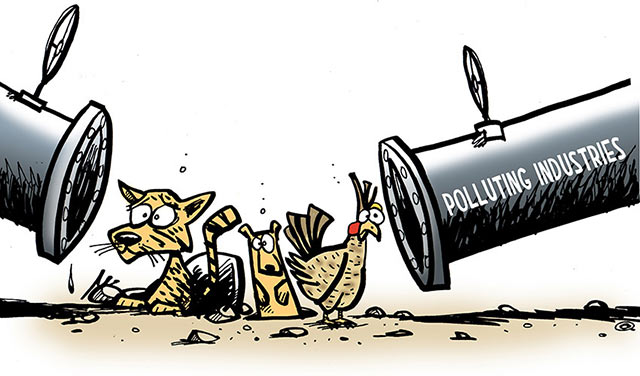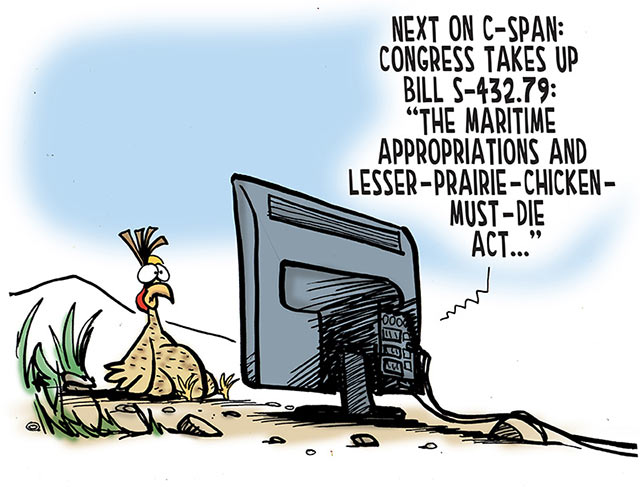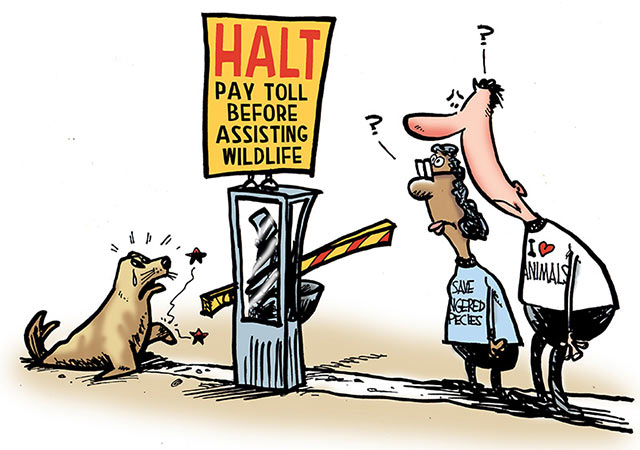
Support justice-driven, accurate and transparent news — make a quick donation to Truthout today!
Members of Congress have introduced more than 80 proposals aimed at gutting the Endangered Species Act this year. Thirteen of these anti-wildlife measures have been added to House and Senate must-pass spending bills. Congressional leaders and the White House are now in intense negotiations that will determine whether these and other anti-environmental provisions are included in the final government spending bill.
When one of the leaders in charge of setting our nation’s environmental policy boasts about wearing boots made from the skins of endangered species, it is a dark day for anyone who supports the continued protection of creatures great and small. Yet, this is the reality of having Senator Jim Inhofe of Oklahoma heading up the Senate Committee on Environment and Public Works. Inhofe was being flippant when he told a Washington Post reporter that his cowboy boots were probably made from “some endangered species,” adding, “I have a reputation to maintain.”
Indeed, Senator Inhofe has one of the worst environmental voting records of any sitting senator. And now he and his compatriots on the Hill have one of the most popular and important conservation laws in their crosshairs: the Endangered Species Act. Supported by 90 percent of Americans and remarkably successful in recovering some of the nation’s most beloved and iconic creatures – including the bald eagle, American alligator and gray whale – the act is under threat of being dismantled piece by piece, and critter by critter, through legislative fiat.
While the claims of these anti-conservation crusaders are often off the wall, their power to undermine this bedrock environmental law is no laughing matter. Now that their pack has overrun both chambers of Congress, their bite may turn out to be just as strong as their bark.
The following are some of the ways Congress is attempting to tear apart the Endangered Species Act:
Way #1: Bring Together Birds of a Feather.

In 2013, 13 members of Congress came together under the banner of the Endangered Species Act Congressional Working Group to discuss ways in which the act is working well and to identify how it could be updated and how to boost its effectiveness for both people and species.
While it seemed a reasonable enough premise, the team turned out to be a self-appointed group of anti-Endangered Species Act members, all with atrocious voting records on the environment.
In 2014, the group issued a set of proposals aimed at diluting the power of the act. Four of those made it into a package of bills known as the “21st Century Endangered Species Transparency Act,” which passed the House but stalled in the Senate.
Though the group disbanded this session, iterations of their destructive bills are currently snaking their way through the halls of the Capitol.
So who’s backing the group? The 800 pound gorilla in the room is the oil and gas industry. Of the working group members who were re-elected to this Congress, oil and gas interests were the leading donors to the collective’s 2014 election campaigns, contributing $943,000. Other industries including mining groups, big agricultural interests and pesticide manufacturers also see safeguards for species as hurting their bottom line. But the truth is that the act is straightforward and flexible, and it certainly allows for development and for economic growth. Nonetheless, big industries give big money to legislators who are bent on pecking away at the Endangered Species Act.
Way #2: Form an Anti-Wolf Pack.

The Latest: Both the House and Senate appropriations bills include a policy “rider” – a provision related to policy, not funding levels – that removes wolves in Wyoming, Michigan, Wisconsin and Minnesota from the endangered species list.
If this rider becomes law, wolves in these states could be subject to the same sort of unregulated slaughter that nearly wiped them out in the first place. The rider would also strip citizens of the right to further challenge these delistings in court. Take action now and tell President Obama to reject this politically-motivated, scientifically unsound rider.
The reintroduction of wolves to the Northern Rocky Mountains has been hailed as one of the greatest achievements of the Endangered Species Act. It also positioned the gray wolf as a poster child of the act, and therefore it became one of the biggest targets for foes of the conservation law.
In 2011, members of Congress managed for the first time since the act was enacted to strike protections for an individual species based purely on political motivations and not on science. Congressmen in the Northern Rockies succeeded in delisting wolves in Idaho and Montana from the Endangered Species Act by slipping wording into the bicameral bill to fund the budget, effectively turning the act into a political bargaining chip.
Following that lead, several Congressmen have recently set out to eradicate remaining federal protections for wolves across at least four states, turning over control to states that have increasingly hostile wolf management practices.
Who’s leading the pack? Wyoming Congresswoman Cynthia Lummis, who has had wolves in her sights for years, successfully lobbying for their delisting in her home state in 2011. When a court ruled that the state was mismanaging the wolf population and restored protections, she came back this year teeth bared, introducing another bill with Rep. Reid Ribble of Wisconsin that would skirt the court’s legal opinion and leave wolves vulnerable both in the Cowboy State, as well as several Great Lakes states.
What’s the pack howling about? Anti-wolf congressional representatives have relied on fairy tales over facts to garner support for otherwise unpopular anti-wolf actions. Time and again they reject scientific findings about wolf recovery and play up fantastical myths about the animals’ supposed danger to people.
“Nothing is more attractive to a wolf than the sound of a crying baby,” said then-Rep. Steve Pearce in 2007 about a proposed bill to stop the federal Mexican wolf reintroduction program in southern New Mexico.
His statement of course flies in the face of the fact that there has never been a single recorded human death by wolf attack in the Lower-48. That didn’t stop Rep. Don Young of Alaska from perpetuating this myth during a recent exchange with Interior Secretary Sally Jewell.
“I’d like to introduce [wolves] in your district. If I introduced them in your district, you wouldn’t have a homeless problem anymore,” he said in response to a letter to Jewell from 79 of his congressional colleagues who support continued wolf protections.
Way #3: Declare Open Season on Individual Species.

The Latest: Numerous policy “riders” have been tacked onto the must-pass spending bills that would prevent individual species from receiving protections under the Endangered Species Act.
The riders target species including the greater sage grouse lesser prairie chicken, northern long-eared bat, and Sonoran desert tortoise. Take action now and tell members of Congress that must-pass spending bills are no place for making decisions about the fate of species.
Emboldened by the success they had delisting wolves in Idaho and Montana, legislators have been aiming to pick off individual vulnerable species one at a time by slipping in riders to often-unrelated bills that would deny protections for these species under the Endangered Species Act.
In other words, legislators could use political cunning to effectively kick a species off the Ark.
Who’s out hunting? Among the Anti-Noahs is Sen. Jerry Moran of Kansas, who offered an amendment on the Keystone XL pipeline bill that would have removed federal protections for the lesser prairie chicken. Sen. John Thune of South Dakota, Sen. Inhofe and other members of the House and Senate have also pushed legislation to block or remove protections for wolves, burying beetles, the long-eared bat, and other species. In 2014, then-Rep. Cory Gardner of Colorado introduced a bill with the laughable title “The Sage Grouse Protection and Conservation Act,” which would prevent the sage grouse from being listed under the act for a decade.
Why corner single species? Many of the species singled out by congressional attacks are those that happen to live near areas or resources that corporate interests want to develop.
“[Scientists] are saying that the chicken won’t breed if we’ve got the rigs running during their hours of breeding. Now I don’t know about you, but I didn’t ever find breeding to fit conveniently into a time of the day,” said Rep. Steve Pearce of New Mexico at a rally, speaking about the lesser prairie chicken getting in the way of oil extraction operations.
Way #4: Establish No Man’s Lands for Species Protections.

Some legislators have introduced bills that exclude entire states or regions from following conservation requirements under the Endangered Species Act.
Rep. Rob Bishop of Utah has employed this strategy several times over. In 2010, he introduced a bill that would exclude gray wolves from receiving any Endangered Species Act protections in the state of Utah. He also sponsored legislation that would delay listing under the act of two grouse species in 11 states for at least 10 years.
Rep. Bishop also led a bill in 2011 that would explicitly exempt U.S. Customs and Border Patrol from complying with a wide array of federal environmental protections – including the Endangered Species Act – within 100 miles of the Mexico and Canada borders.
There’s also a current fight in Utah over a species of prairie dog found just within that state. The act is mandated as a federal law under the Interstate Commerce Clause, and some states are making the argument that species that exist only within the boundaries of the state should not be eligible for federal protection. Legislation limiting Endangered Species Act protections to species that live in multiple states would devastate endangered species conservation and lead to more extinctions. Such legislation would, for example, exclude from federal protection every listed plant or animal on Hawaiʻi. As of 2010, roughly 50% of listed species were intrastate species (i.e., species found in just one state).
So far, arguments that the act should only protect interstate species have not held up in any federal appeals court, and the Supreme Court has rejected requests to hear any such case.

The tiny delta smelt has been blamed for everything, from stealing water from California’s farmers to causing the next Dust Bowl. This supposed monster’s numbers used to measure in the millions, but a 2014 survey only counted nine fish.
The reality is the drought – not environmental protections – is causing the water shortages to California farms, as well as to cities, towns, the fishing industry, the outdoor recreation industry and plenty of other users. The protections in place for the smelt have not affected any of the water allotment to the Central Valley this year.
So who’s fingering the fish? Reps. Devin Nunes, David Valadao, Tom McClintock – all legislators from California’s thirsty agricultural nexus, the Central Valley.
What are they saying? Arguing for an environmentally-destructive bill he introduced under the guise of drought relief, Rep. Nunes went on a tirade against Northern California environmentalists and people who live in cities, saying, “I don’t see any of them up here saying that they’re going to tear down this system, dump this water into the Bay to protect their stupid little fish, their little delta smelt that they care about.”
Big Ag is using the crisis of the drought to try and rollback environmental protections like those offered by Endangered Species Act to funnel water from the north directly to the Central Valley farms, which are already responsible for 80 percent of the state’s water consumption.
What’s in the forecast? Rep. McClintock introduced a bill in March that blocks Endangered Species Act protections during drought declarations. And in July, a so-called “drought-relief” bill, H.R. 2898, passed by a vote of 245–176. Introduced by Rep. Valadao, the legislation benefits a few – namely corporate farms in California – at the expense of water users throughout the state and the health of the very environment on which the California economy depends.
Way #6: Lasso Scientists in Red Tape.

Former Rep. Doc Hastings, backed by the members of that congressional working group, introduced a bill last year that would both bog down scientists in bureaucracy and threaten to further imperil already vulnerable species.
The bill would require federal wildlife agencies to publish online the data underlying all listing and delisting decisions. On its face, open data is a good thing, but the bill does not account for real-world issues involved in such blanket data-sharing, such as exposing some imperiled species to poaching or illegal collection.
Another bill introduced in the last Congress by Rep. Randy Neugebauer of Texas would require the U.S. Fish & Wildlife Service and the National Marine Fisheries Service to consider all data submitted by state, tribal and county governments as the best available science, no matter what the quality of this data. In other words, a county government heavily influenced by a mining corporation could commission its own report, not necessarily even conducted by actual scientists, and yet the federal wildlife agencies would be required to include this county “data,” which would skew agency decision-making under the act.
Both bills have already been reintroduced in some form in the current Congress.

Congress has long recognized that the government needs average citizens to help enforce all sorts of important laws, including the Endangered Species Act.
Citizen suit provisions, found in civil rights laws, voting rights laws, and environmental laws, allow citizens to go to court to ensure that our laws are upheld.
One bill introduced by Rep. Cynthia Lummis sought to undermine citizen enforcement of the Endangered Species Act by requiring burdensome agency reporting that focus solely on the costs of enforcing the act without any accounting for the benefits these cases provide. Another bill introduced by Rep. Bill Huizenga of Michigan would restrict citizens’ ability to recover the full costs of litigation when they win enforcement actions in court.
Though neither of these bills made it beyond the House in the last Congress, these ideas have cropped up in other places. Earlier this year, an amendment was offered for the Keystone XL Senate bill that would have undermined Endangered Species Act citizen suits and limited the ability of citizens to hire a lawyer for the enforcement of the act.
The Endangered Species Act is one of the most powerful and effective environmental laws of the land.
But since its enactment over 40 years ago, the act itself has become endangered by the heads of industries that want free rein to dig, blast, extract, and pollute wherever they see fit. These powerful interests and their friends in Congress have made it a priority to rollback protections for our wildlife, fish, and plants and the habitats upon which these species depend.
The law is based in common sense and balanced solutions that offer flexibility to communities, private landowners, and government agencies. When upheld properly and adequately funded, the Endangered Species Act succeeds in pulling species back from the brink of extinction.
A terrifying moment. We appeal for your support.
In the last weeks, we have witnessed an authoritarian assault on communities in Minnesota and across the nation.
The need for truthful, grassroots reporting is urgent at this cataclysmic historical moment. Yet, Trump-aligned billionaires and other allies have taken over many legacy media outlets — the culmination of a decades-long campaign to place control of the narrative into the hands of the political right.
We refuse to let Trump’s blatant propaganda machine go unchecked. Untethered to corporate ownership or advertisers, Truthout remains fearless in our reporting and our determination to use journalism as a tool for justice.
But we need your help just to fund our basic expenses. Over 80 percent of Truthout’s funding comes from small individual donations from our community of readers, and over a third of our total budget is supported by recurring monthly donors.
Truthout has launched a fundraiser, and we have a goal to add 231 new monthly donors in the next 48 hours. Whether you can make a small monthly donation or a larger one-time gift, Truthout only works with your support.